Cool Jobs: Film Sound Engineer
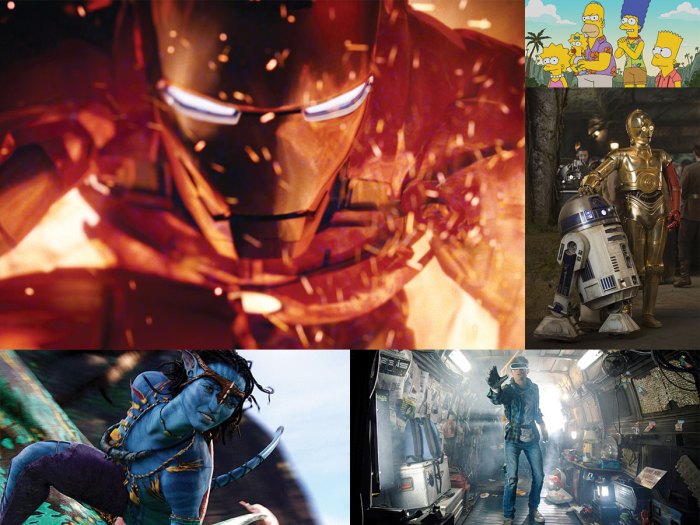
All the movie stills in this feature represent films Casari has worked on, including Marvel movies.
The actors are ready. The camera crew is in place. The director yells, “Action!” But a jet soars overhead, and the production audio picks up that noise while the actors deliver their lines.
That’s OK. They can count on film sound engineers like Derek Casari, who use a process called automated dialogue replacement (ADR).
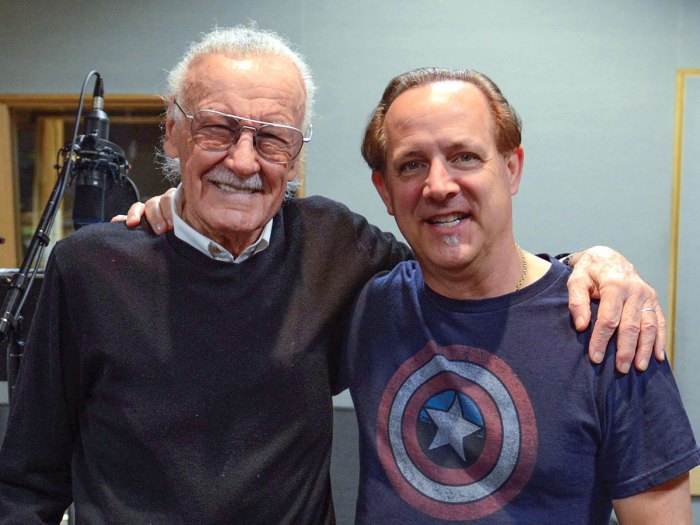
Derek Casari (right) poses with Marvel Comics creator Stan Lee.
Eagle Scout Casari worked as a film sound engineer for more than 30 years, including two decades with 20th Century Fox, helping to replace audio on hundreds of feature films and television shows. Along with his ADR teams, his work on the post-production side of filmmaking helped to bring clear, impactful words to match the scenes on the screen. It’s an important role that often doesn’t see the spotlight.
“A lot of people who have aspirations to get into the entertainment industry either want to be an actor or a director or these higher-profile kinds of jobs,” Casari says. “That path is a lot more difficult. The need for people below the line, especially in a technical capacity, is greater.”
ONE GIANT LEAP
Before his Hollywood career launched, Casari was with Troop 68 in Woodland, California. One of Casari’s more exciting Scouting moments came during the 1969 National Jamboree in Idaho.
Thousands of Scouts there watched the Apollo 11 astronauts take humankind’s first steps on the moon. Some witnessed the broadcast on a small TV, while many saw a delayed showing on a big screen.
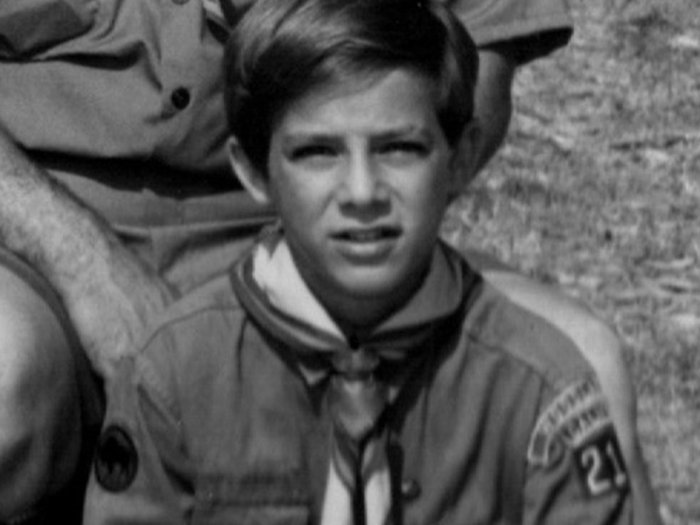
Casari at the National Jamboree in 1969.
“All of these Scouts were gathered around a black-and-white TV, watching Neil Armstrong and Buzz Aldrin walk on the moon,” Casari says. “That did inspire me to think about a career in technology.”
After graduating high school, Casari attended Purdue University, where he helped launch a college radio station and worked as a DJ. He later moved to San Francisco and worked at a radio station while continuing his education at two city colleges. His experience and connections led to positions at a recording studio and an electronics company that specialized in audio gear.
He says one of the most valuable skills he picked up along the way was troubleshooting. If a piece of electronic equipment wasn’t working, he needed to figure out how to fix it. It’s a skill he’d rely on as a film sound engineer.

GET YOUR POPCORN READY
Completing a film requires many roles, including financing, writing, acting and filming — and that’s just the first half of the process.
“The post-production is broken up into dialogue, music and effects,” Casari says.
That includes people who create sound effects, called foley artists and sound designers; produce music, called composers and music editors; and replace clips of dialogue — that’s the ADR team.
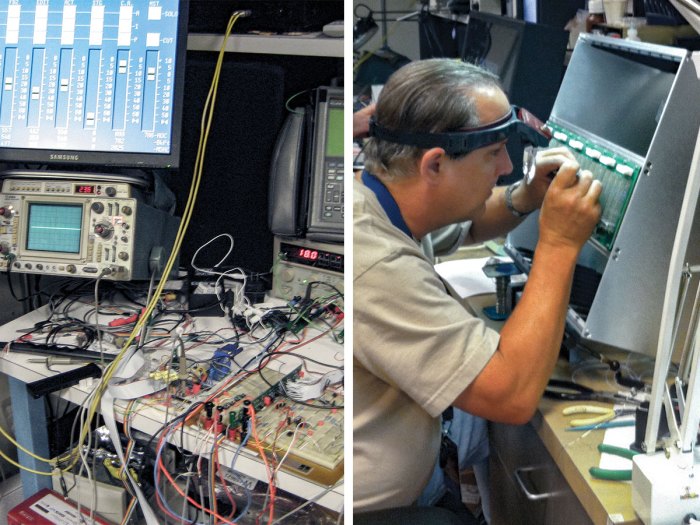
Left: Casari and his team built a custom patented ADR console. Right: Casari does “wire-wrapping,” a detailed process for making electrical interconnections between circuit board connectors.
In ADR, the engineer, recordist and mixer work together to set up a sound studio, record new dialogue and save selected clips so they can replace certain audio captured on set. The mixer’s primary responsibility is to run the audio console; the recordist saves and marks the clips; and the engineer handles the rest of the equipment, like the microphones and projectors. Actors watch the movie scenes and deliver their new lines. Sometimes they aren’t able to be in the studio for this, and the ADR team must coordinate with them so the scenes play seamlessly in studio and where the actors are, whether they’re in another state or on the other side of the world.
Why don’t they do all of this when filming?
“Many times, production sound, which is done while shooting, takes second fiddle to the images the crew is capturing,” says Ted Gagliano, former president of feature post-production at 20th Century Fox.
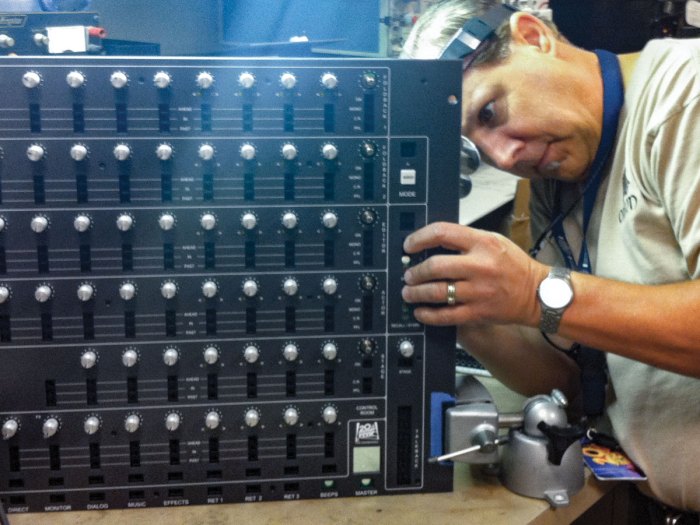
Casari works on the main control panel of an ADR console
“This is because there can be wind machines and lots of peripheral sound, or the performance and exact line-reading is not what the director and studio believes will be best.”
The engineer makes sure the recording session runs smoothly. They must troubleshoot problems and inform the director and actor of any delays. The job can turn stressful, but being prepared helps projects stay on schedule.
AMONG THE STARS
A few of the blockbuster films Casari is credited on include Avatar, Ready Player One, Star Trek, Star Wars: The Force Awakens, Thor and Iron Man 2. He also worked on The Maze Runner, Mission: Impossible, Pirates of the Caribbean and the Planet of the Apes series. On the TV side, he helped with 400 episodes of The Simpsons, 207 episodes of The X-Files and 227 episodes of Bones.
But just because he’s seeing the scenes before all the editing is done doesn’t mean he’s watching films before anyone else.

“Rarely would you watch a movie from beginning to end,” he says. “You could be working on different reels out of order, so you never know what the movie looks like.”
That’s especially true in animated features because the voice talent records their lines first, and then the animators draw the film based off the audio.
Casari has worked on major pictures; he was part of a team that built a patented audio console; and now he is helping to produce an animated feature film. Many of his daily rewards over the years came in the conversations with filmmaking masters between takes.
“Getting to work on a lot of really great films and getting to chat with great directors — those are the kinds of things that are really enjoyable that offset those tense days,” Casari says.”
Job Facts: Film Sound Engineer
WHAT TO EXPECT: The hours can be long, and the work can be fast paced. Joining a union can aid in stability for job benefits and provide contracts to define working conditions. Working at independent studios can help you gain experience.
JOB OUTLOOK: Many film sound engineer positions work within major production studios; however, as more independent studios and streaming services are established, more opportunities will likely arise. To be marketable to more companies, it’s good to know how to perform many tasks rather than specialize in a few.
EDUCATION/TRAINING: An associate’s degree in electronics is helpful. Having a varied set of skills — including those in audio/visual, information technology, telecommunications, recording software and voice over internet protocol (VoIP) — would be helpful, too.
SALARY: $51,000 to $114,000. It depends on where you work, but earning more than $90,000 a year isn’t uncommon.
FOR MORE INFORMATION:
go.scoutlife.org/audiopostproduction
PHOTOS COURTESY OF DEREK CASARI; 20TH CENTURY FOX/COURTESY OF EVERETT COLLECTION; PARAMOUNT/COURTESY OF EVERETT COLLECTION; 20TH CENTURY FOX FILM CORP/COURTESY OF EVERETT COLLECTION; DAVID JAMES/WALT DISNEY STUDIOS MOTION PICTURES/LUCASFILM LTD./COURTESY OF EVERETT COLLECTION; JAAP BUITENDIJK /WARNER BROS.; GETTY IMAGES/ISTOCKPHOTO; WARNER BROS. PICTURES/COURTESY OF EVERETT COLLECTION; FRANCOIS DUHAMEL/PARAMOUNT/COURTESY OF EVERETT COLLECTION; WALT DISNEY PICTURES/COURTESY EVERETT COLLECTION
Leave a Comment